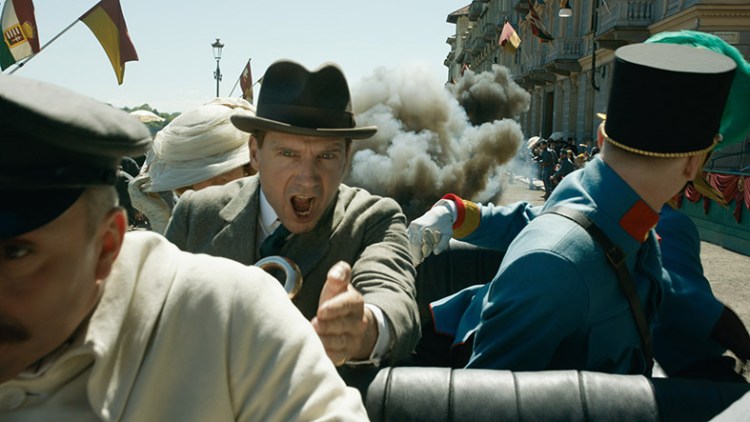Matthew Vaughn’s ‘The King’s Man,” a prequel to the filmmaker’s two entertainingly comic-book-y action-adventure spy-larks “Kingsman: The Secret Service” and “Kingsman: The Golden Circle,” is at once more bonkers and more staid than either of its predecessors (if a film that features a dancing, omnivorously bisexual, murderous Grigori Rasputin as one of its villains can be called staid).
Set against the backdrop of World War I and its origins, the film is essentially a trippier, more hallucinogenic version of an episode of “Drunk History” – one that might have been imagined (or dreamed) by a brainy but bored high-schooler who fell asleep during World History class after eating magic mushrooms, only to wake up with a crazy, what-if story involving several historical figures, minor and major, from the early 20th century rattling around in their head. That story, written by Vaughn and Karl Gajdusek, posits a revisionist theory about the causes of the global conflict, which only begins, in this case, with the 1914 assassination of Archduke Franz Ferdinand of Austria (Ron Cook) by the Bosnian Serb Gavrilo Princip (Joel Basman).
In this telling, Princip is merely a pawn in a shadowy cabal of global criminals. That cabal includes the Russian monk Rasputin (Rhys Ifans), the Dutch spy Mata Hari (Valerie Pachner), Russian revolutionary leader Vladimir Lenin (August Diehl) and the Austrian mentalist Erik Jan Hanussen (Daniel Brühl), all doing the bidding of a puppet master from his secret mountaintop lair, whose identity is not revealed until the film’s climax. If the story is fun – and it is fitfully, only after a protracted, sloggy set up – it’s a lot less so than either of the first two films.
Set on the opposite side of this cabal – which is working behind the scenes to manipulate U.S. President Woodrow Wilson (Ian Kelly), King George V of England, Czar Nicholas of Russia and Germany’s Kaiser Wilhelm II (the last three all cousins in real life, and all played by Tom Hollander) – is the wholly fictional pacifist the Duke of Oxford (Ralph Fiennes). Aiding him are his son, Conrad (Harris Dickinson), and two loyal underlings: Shola (Djimon Hounsou) and Polly (Gemma Arterton).
Note: “The King’s Man” contains just enough far-fetched-sounding facts to send you running straight for Wikipedia as soon as the houselights come up. You’ll find a surprising amount of truth (or half-truth) here, including details about the legendarily unkillable Rasputin’s death, but also an equal amount of stuff that’s entirely made up. (Did King George really change his Teutonic family name, Saxe-Coburg and Gotha, to Windsor, as a reaction to anti-German sentiment? Yes. Did Mata Hari try to blackmail Wilson after seducing him? Probably not.)
But you’d be advised to put down the phone, sit back and try to enjoy this wild ride. It must be noted, however, that an action film whose hero is a pacifist, at least initially, hardly seems the best formula for rock-’em, sock-’em action. Once Oxford abandons his peace-loving principles – arrived at in a prologue that takes place during the Boer War, and precipitated by the death of Oxford’s wife (Alexandra Maria Lara) – the ferocious spirit of the franchise returns.
That spirit is a notably violent one, and it is expressed in an unapologetically cartoonish way. Vaughn’s stylistic signature of balletic brutality is among the film’s pleasures, although the narrative’s hybrid tone – part academic, part acid trip – is not.
Send questions/comments to the editors.


